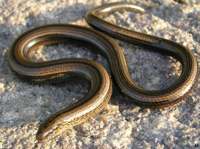Indian zoologist finds new species of limbless lizard
An Indian zoologist has found a new species of limbless lizard in a forested area in the country's east.

"Preliminary scientific study reveals that the lizard belongs to the genus Sepsophis," said Sushil Kumar Dutta, who led a team of researchers from "Vasundhra," a non-governmental organization, and the North Orissa University.
The newly found 18-centimeter (7-inch) long lizard looks like a scaly, small snake, Dutta said. "It prefers to live in a cool retreat, soft soil and below stones."
"The lizard is new to science and is an important discovery. It is not found anywhere else in the world," Dutta told The Associated Press. He is the head of the zoology department of the North Orissa University in the eastern Indian town of Baripada.
While modern snakes and lizards are derived from a common evolutionary ancestor, they belong today to two entirely separate groups of animals, or orders. Snakes, over millenia, gradually lost their limbs and developed their characteristic forms of locomotion. But modern limbless lizards are not snakes, Dutta said.
The lizard was found 10 days ago during a field study in the forested region of Khandadhar near Raurkela in Orissa state, about 1,000 kilometers (625 miles) southeast of New Delhi, he said.
"The new species will be scientifically described at a later stage after accumulation of more data," Dutta said.
The other limbless lizards belonging to different families have been found in India's Nicobar island, in the northeast, and in Orissa and Andhra Pradesh states, he said.
The closest relatives of the new species are found in Sri Lanka and South Africa, Dutta said.
However, the species found ten days ago is new to the world, Dutta said.
Another species of the same genus, "Sepsohis punctatus," was found in 1870 from the Golconda hills in Andhra Pradesh, said Varadi Giri, a scientist at the Bombay Natural History Society, who was not part of the team that found the lizard. Giri said Dutta is a reputed zoologist and his claim appears legitimate. "But for an independent confirmation, one has to wait for the publication of the finding in a reputed science magazine."
Subscribe to Pravda.Ru Telegram channel, Facebook, RSS!


